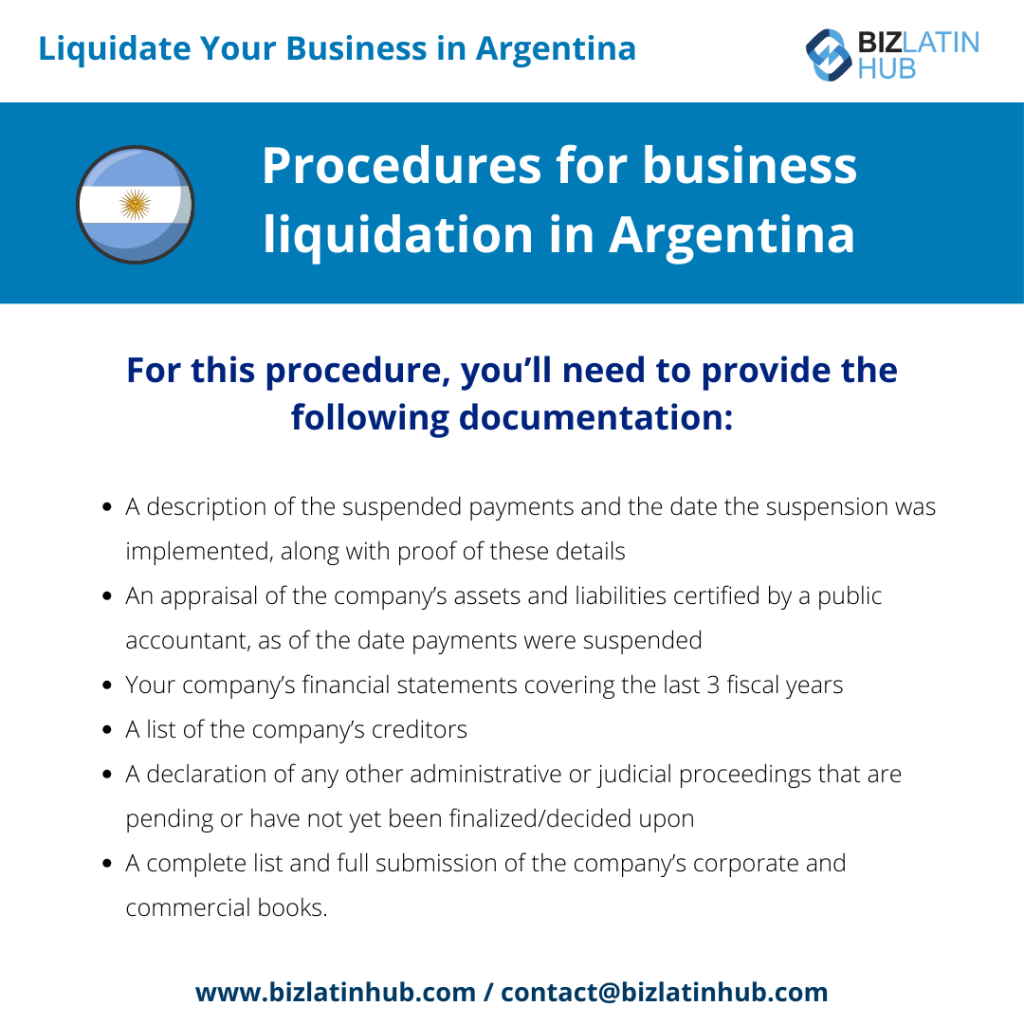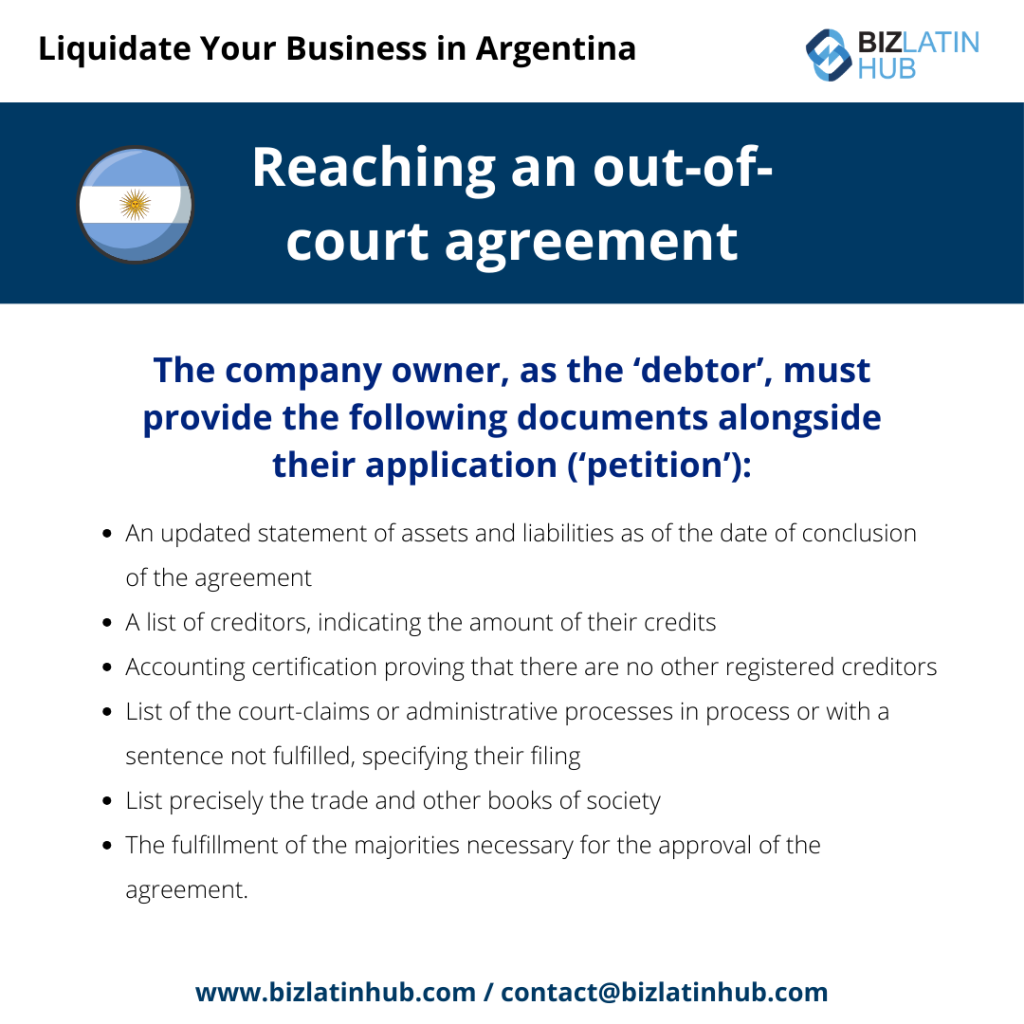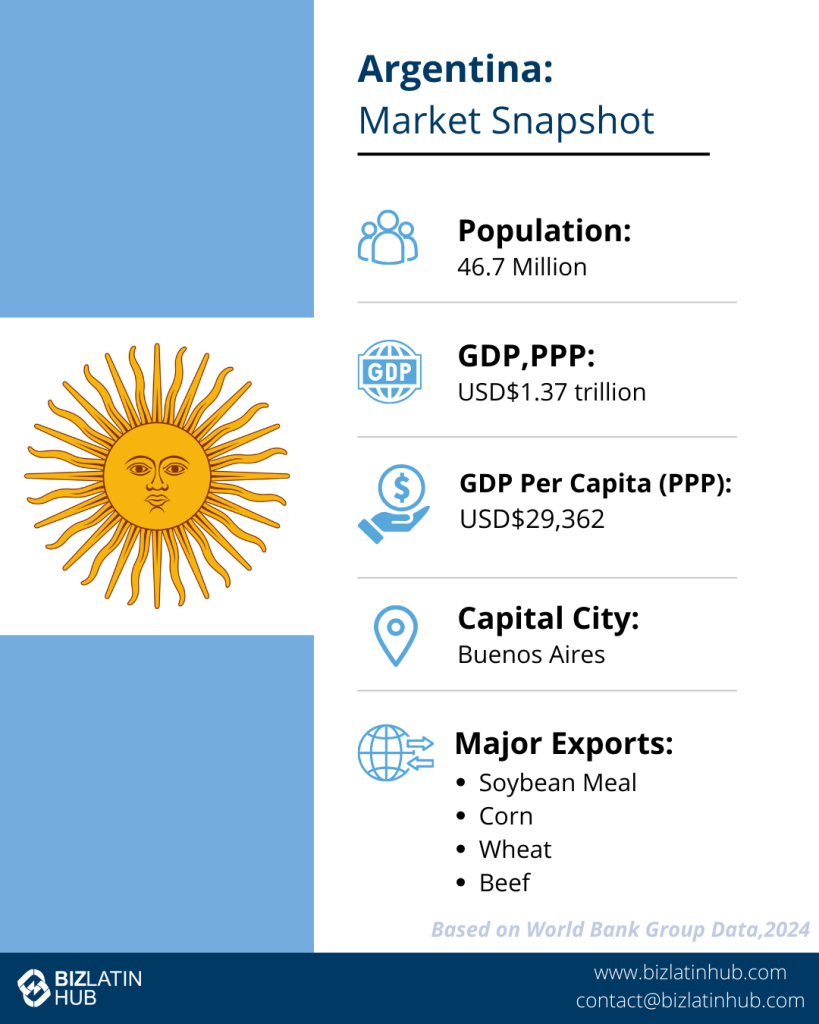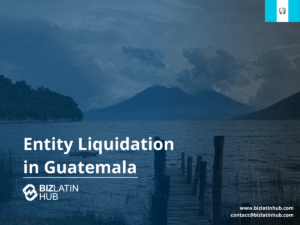Closing a business in Argentina involves a formal process governed by tax and corporate regulations. Whether due to restructuring, insolvency, or voluntary closure, businesses must follow defined legal procedures. This 2025 guide explains how to liquidate a company in Argentina, including responsible authorities, insolvency options, timelines, and frequently asked questions. It is also relevant to those closing a business or considering company incorporation in Argentina.
Key takeaways on how to liquidate a company in Argentina
| 5 Steps to liquidate a company in Argentina | Shareholders’ Meeting. Appointment of Liquidator. Preparation of a final balance sheet. Settlement of all outstanding debts and obligations. Distribution of remaining assets among shareholders. |
| What is the timeframe to liquidate a company in Argentina? | It can take anywhere from six months to a year to fully liquidate a company in Argentina, if everything is in order. Involuntary processes can be much longer. |
| What are the reasons to liquidate a company in Argentina? | These vary, but the key point is to stay compliant and in good standing with the authorities. |
| What are the requirements for involuntary liquidation in Argentina? | This can be triggered by not settling outstanding debts. Unpaid creditors can make a petition that can lead to a bankruptcy declaration. |
Options for insolvent companies
Voluntary Liquidation
Initiated by the shareholders, this is used when the company is solvent but wishes to formally shut down.
Steps include:
- Shareholders approve the dissolution and appoint a liquidator
- The resolution and appointment are filed with the IGJ
- A legal notice is published in the Boletín Oficial for five business days
- All debts and taxes are paid, including labor and social security contributions
- A final liquidation balance sheet is prepared and approved
- Remaining assets are distributed among shareholders
- The company is deregistered, and the CUIT is canceled
Involuntary Liquidation (Bankruptcy)
Filed in Commercial Court due to insolvency
Steps include:
- A court receives a petition from creditors or the company itself
- A liquidator is appointed by the court
- Creditors are formally notified and submit claims
- The company’s assets are liquidated under judicial supervision
- Funds are distributed according to creditor priority
- The company is formally closed and deregistered
Why liquidate a company in Argentina?

Companies may liquidate for various reasons. The process may be voluntary, initiated by shareholders, or involuntary, enforced by the courts due to insolvency or legal violations.
Common reasons for liquidation include:
- The company has ceased operations or is no longer profitable
This typically applies to dormant entities or businesses facing long-term losses. Liquidation provides a formal legal method to close the company and limit future obligations. - Business restructuring or consolidation
Companies that merge with other entities or shift operations may liquidate older entities that are no longer needed. - Ongoing compliance or tax issues
Regulatory issues or accumulated debt with tax authorities may make continuation impractical. - A court order due to insolvency or lawsuits
In some cases, a court mandates liquidation to settle unpaid obligations. - Strategic exit from the Argentine market
Companies may leave the country as part of a regional strategy, requiring a formal closure of the legal entity.
The liquidation of companies in Argentina is regulated by two primary laws:
- General Companies Law No. 19,550
Governs company formation, modifications, and voluntary dissolution - Bankruptcy Law No. 24,522
Applies to companies undergoing court-supervised liquidation due to insolvency
Key institutions involved:
Commercial Courts
Handle judicial liquidation cases when the company is insolvent
IGJ (Inspección General de Justicia)
Registers and oversees voluntary company liquidations
AFIP (Federal Tax Authority)
Ensures tax filings are complete and processes the cancellation of the company’s tax ID (CUIT)
A note on reorganization

Reorganization allows a company to stay in business. Its owner(s) can retain the company’s assets, but ‘reorganizes’ or renegotiates its debt payments to creditors.
In a reorganization process known as a concurso preventivo de acreedores, the court designates a receiver to administrate the company finances and act to prevent bankruptcy or secure, where possible, due payments to creditors
The process involves the company owner can propose a reorganization plan that will be considered by the court and these appointed parties.
Reorganization, or concurso preventivo, is a legal alternative to liquidation that allows companies to restructure debts while continuing operations. This court-approved process aims to avoid full shutdown by preserving business continuity under supervision.
Argentina Company Liquidation Timeline
- Voluntary liquidation generally takes 6 to 12 months, depending on compliance status and document readiness
- Involuntary liquidation may last 12 to 24 months or longer due to court involvement and creditor participation
Factors that can affect the timeline:
- Delays in AFIP clearance
Outstanding tax obligations, interest, or penalties must be resolved before tax authorities approve closure - Outstanding labor claims
Labor disputes or unpaid severance must be addressed before finalizing the liquidation - Missing or incomplete accounting records
A complete and audited liquidation balance sheet is required; inaccurate or missing records can significantly delay the process - Court scheduling and holidays
Judicial delays and closures during holidays often slow down court-led procedures - Statutory notice periods
Mandatory public notices and creditor response windows introduce fixed delays into the process
FAQs on how to liquidate an entity in Argentina
Based on our extensive experience these are the common questions we receive from clients about liquidating an entity in Argentina.
1. Can foreign companies liquidate a business in Argentina?
Yes. Foreign-owned entities such as branches or subsidiaries can be legally dissolved. However, this often requires additional documentation, such as notarized resolutions from the parent company, Spanish translations, and confirmation that all local obligations have been fulfilled.
2. How long does liquidation take in Argentina?
Voluntary liquidations typically take between 6 and 12 months. Court-led (involuntary) liquidations often last 12 to 24 months depending on the complexity of the case, number of creditors, and compliance delays.
3. What is the difference between liquidation and bankruptcy in Argentina?
Liquidation is the formal closure and deregistration of a company. Bankruptcy refers specifically to court-managed insolvency processes, usually triggered when liabilities exceed assets and creditors seek legal resolution.
4. Who manages the liquidation process?
In voluntary cases, a liquidator is appointed by the company’s shareholders. In court-led proceedings, the Commercial Court appoints a judicial liquidator who handles all operations until closure.
5. What are the steps to voluntarily liquidate a company?
Hold a shareholders’ meeting and pass a resolution
Appoint a liquidator
Register the decision with IGJ or relevant commercial registry
Publish a liquidation notice in the Boletín Oficial
Pay all outstanding liabilities (taxes, labor, suppliers)
Submit final balance sheet
Cancel CUIT and deregister the company
6. What documents are needed for liquidation?
Shareholder resolution and meeting minutes
Appointment of liquidator (notarized)
Updated accounting books
Final liquidation balance sheet
Proof of published notice in Boletín Oficial
Labor compliance certificates
AFIP tax clearance
CUIT cancellation request (Formulario 885)
7. Are there penalties for not formally liquidating a company?
Yes. If a company is inactive but not legally closed, it continues to accumulate tax filing obligations and may be fined by AFIP, IGJ, or other regulatory authorities.
8. Can a company under investigation or with debt be liquidated?
Liquidation is possible, but only after resolving any active legal or labor claims. If insolvency exists, the company may be required to enter a judicial liquidation or restructuring process first.
Doing Business in and out of Argentina: Entry and Exit Strategies

Argentina offers strong business potential in energy, agribusiness, fintech, and professional services. However, market entry and exit require full compliance with corporate, tax, and labor regulations. Whether incorporating a new business or closing an existing entity, working with a local partner is essential.
Biz Latin Hub provides complete lifecycle support, including:
- Company formation and legal structuring
- Monthly tax and compliance services
- AFIP and IGJ representation
- Payroll and employment setup
- Legal liquidation and deregistration services
Our bilingual teams ensure you meet your obligations efficiently and in accordance with Argentine law.
Contact the experts to liquidate your business in Argentina
Exiting a market can be stressful, and involve many bureaucratic steps. Business liquidation in Argentina involves a due process to follow and you’ll be seeking reassurance from your legal representative that you’re in good hands.
When you partner with Biz Latin Hub – Argentina, we can help you with all aspects of your investment in Argentina, minimizing risk and ensuring smooth sailing as you enter and operate within the region. Contact us and see how we can add value to your investment in Argentina.






